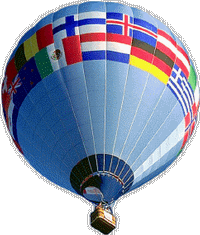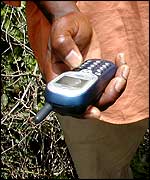| Wednesday, December 11, 2002 |  |
|
|
|
 From Tom Munnecke: From Tom Munnecke:to quote Freeman Dyson: "To help the poor from "the top down" is least likely to succeed. But science and technology are concentrated at the top, making top down the method of choice for those in power. The challenge, he said, is to find ways to help people by providing science and technology from "the bottom up." Â…Three successful "bottom up" approaches described by Dyson share an important trait: As they succeeded, they spread quickly. Dyson calls this 'autocatalysis' -- a chemistry term meaning that as a chemical reaction proceeds, it automatically accelerates. When, for example, British farmers in the 1950s began using drying sheds to keep their harvests dry, the technology spread rapidly. "As soon as the sheds were shown to be effective, every farmer had to have one," Autocatalysis is a "key virtue to look for in any technology that claims to improve human welfare on a large scale," he added."
He introduces two profound questions:
1. How do we improve human welfare on a global scale?
2. What energy could 'automatically accelerate' to fuel this improvement?
It seems to me that we can address #1 above by applying our knowledge of scale free networks to create a cascade of uplift. To do so, however, we need to figure out how to talk about uplift. One way to do this is to create an Uplift Pattern Language (UPL) which allows us to talk about patterns of uplift. This is modelled after Christopher Alexander's work on architectural patterns which has been adopted in the software community for software Pattern Languages. The Jini Community Pattern Language is an example of this applied to a community. The Uplift Pattern Language would define patterns of uplift and their contexts, within a benegnostic framework.
One application of the UPL would be to create Virtue Viruses, which would be self-propagating, self-organizing activities/messages/events which would exploit the most powerful uplift patterns. Seligman's work on Values in Action provides some fuel for thinking about this. This also relates to Hirshmann's "Finding where Virtue is afoot" quoted by David Ellerman.
[ Patterns | 2002-12-11 05:17 | | PermaLink ] More >
|
|
|
|
 "Every day we slaughter our finest impulses. That is why we get a heart-ache when we read those lines written by the hand of a master and recognize them as our own, as the tender shoots which we stifled because we lacked the faith to believe in our own powers, our own criterion of truth and beauty. Every man, when he gets quiet, when he becomes desperately honest with himself, is capable of uttering profound truths. We all derive from the same source. There is no mystery about the origin of things. We are all part of creation, all kings, all poets, all musicians; we have only to open up, to discover what is already there." -- Henry Miller "Every day we slaughter our finest impulses. That is why we get a heart-ache when we read those lines written by the hand of a master and recognize them as our own, as the tender shoots which we stifled because we lacked the faith to believe in our own powers, our own criterion of truth and beauty. Every man, when he gets quiet, when he becomes desperately honest with himself, is capable of uttering profound truths. We all derive from the same source. There is no mystery about the origin of things. We are all part of creation, all kings, all poets, all musicians; we have only to open up, to discover what is already there." -- Henry Miller
[ Inspiration | 2002-12-11 05:30 | 0 comments | PermaLink ]
|
|
|
|
 I need a piece of software, or a pattern or structure, for solidifying ideas. For putting more meat on something that starts out vague or abstract. Let's say I decide I'm interested in "Patterns of Upliftment" or "Communities of Virtue", but I might not even quite know what that means. Then, when I go through life, or through the web, I might notice "Aha, that's an example of ___" or "That's a good definition of ___" or "Oh, those people are studying ___". And I want to file it with my focus subject. It should be in a format I can easily share, on a webpage, so others can come along and see the idea getting more substantial, and maybe contribute to it. Well, there is Wiki-Wiki, which allows easy posting and updating by multiple people. But I suppose I'm looking for something that actually guides me towards a convergence, a clarification or solidification of the subject matter. A Wiki-Wiki would tend to encourage divergence, creating new branches. A piece of paper doesn't work, because I can't find the original sheet again when I happen to run into a piece of the puzzle I'm trying to assemble. I need a piece of software, or a pattern or structure, for solidifying ideas. For putting more meat on something that starts out vague or abstract. Let's say I decide I'm interested in "Patterns of Upliftment" or "Communities of Virtue", but I might not even quite know what that means. Then, when I go through life, or through the web, I might notice "Aha, that's an example of ___" or "That's a good definition of ___" or "Oh, those people are studying ___". And I want to file it with my focus subject. It should be in a format I can easily share, on a webpage, so others can come along and see the idea getting more substantial, and maybe contribute to it. Well, there is Wiki-Wiki, which allows easy posting and updating by multiple people. But I suppose I'm looking for something that actually guides me towards a convergence, a clarification or solidification of the subject matter. A Wiki-Wiki would tend to encourage divergence, creating new branches. A piece of paper doesn't work, because I can't find the original sheet again when I happen to run into a piece of the puzzle I'm trying to assemble.
[ Patterns | 2002-12-11 15:37 | | PermaLink ] More >
|
|
|
|
 According to BBC, web browsing on mobile phones is working out great for farmers and small vendors in Senegal, who can look up valuable market information. According to BBC, web browsing on mobile phones is working out great for farmers and small vendors in Senegal, who can look up valuable market information. Browsing web pages using a mobile phone may not be very popular in Europe, but it is catching on among canny market traders in Senegal.
The snappily-named Wireless Application Protocol was launched to much fanfare in Europe over two years ago. But has not won many fans, despite the fact that most handsets can use it.
But Senegalese market traders are proving that the technology does have its uses thanks to a project run by Manobi, a joint venture run by French and Senegalese entrepreneurs.
Manobi uses teams to gather information about the prices of foods and goods being sold in the markets in and around Dakar.
[ Technology | 2002-12-11 23:59 | | PermaLink ] More >
|
|
 From Tom Munnecke:
From Tom Munnecke: "Every day we slaughter our finest impulses. That is why we get a heart-ache when we read those lines written by the hand of a master and recognize them as our own, as the tender shoots which we stifled because we lacked the faith to believe in our own powers, our own criterion of truth and beauty. Every man, when he gets quiet, when he becomes desperately honest with himself, is capable of uttering profound truths. We all derive from the same source. There is no mystery about the origin of things. We are all part of creation, all kings, all poets, all musicians; we have only to open up, to discover what is already there." -- Henry Miller
"Every day we slaughter our finest impulses. That is why we get a heart-ache when we read those lines written by the hand of a master and recognize them as our own, as the tender shoots which we stifled because we lacked the faith to believe in our own powers, our own criterion of truth and beauty. Every man, when he gets quiet, when he becomes desperately honest with himself, is capable of uttering profound truths. We all derive from the same source. There is no mystery about the origin of things. We are all part of creation, all kings, all poets, all musicians; we have only to open up, to discover what is already there." -- Henry Miller I need a piece of software, or a pattern or structure, for solidifying ideas. For putting more meat on something that starts out vague or abstract. Let's say I decide I'm interested in "Patterns of Upliftment" or "Communities of Virtue", but I might not even quite know what that means. Then, when I go through life, or through the web, I might notice "Aha, that's an example of ___" or "That's a good definition of ___" or "Oh, those people are studying ___". And I want to file it with my focus subject. It should be in a format I can easily share, on a webpage, so others can come along and see the idea getting more substantial, and maybe contribute to it. Well, there is Wiki-Wiki, which allows easy posting and updating by multiple people. But I suppose I'm looking for something that actually guides me towards a convergence, a clarification or solidification of the subject matter. A Wiki-Wiki would tend to encourage divergence, creating new branches. A piece of paper doesn't work, because I can't find the original sheet again when I happen to run into a piece of the puzzle I'm trying to assemble.
I need a piece of software, or a pattern or structure, for solidifying ideas. For putting more meat on something that starts out vague or abstract. Let's say I decide I'm interested in "Patterns of Upliftment" or "Communities of Virtue", but I might not even quite know what that means. Then, when I go through life, or through the web, I might notice "Aha, that's an example of ___" or "That's a good definition of ___" or "Oh, those people are studying ___". And I want to file it with my focus subject. It should be in a format I can easily share, on a webpage, so others can come along and see the idea getting more substantial, and maybe contribute to it. Well, there is Wiki-Wiki, which allows easy posting and updating by multiple people. But I suppose I'm looking for something that actually guides me towards a convergence, a clarification or solidification of the subject matter. A Wiki-Wiki would tend to encourage divergence, creating new branches. A piece of paper doesn't work, because I can't find the original sheet again when I happen to run into a piece of the puzzle I'm trying to assemble. According to BBC, web browsing on mobile phones is working out great for farmers and small vendors in Senegal, who can look up valuable market information.
According to BBC, web browsing on mobile phones is working out great for farmers and small vendors in Senegal, who can look up valuable market information.